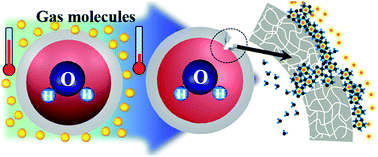Hydrate formation in water-laden microcapsules for temperature-sensitive release of encapsulants†
Abstract
Microcapsules have been widely used to store and release active materials for various purposes. In this work, we design microcapsules that separate an inner water phase from guest molecules in the surrounding medium with a polymeric shell. The water and guest molecules are brought into contact within the shell, where a hydrate is formed when the temperature is lower than the hydrate formation condition. A steady supply of water and guest molecules through the shell matrix into the hydrates yields local cracks in the shell. As the hydrates continue to grow in the absence of external shear flow, the cracks slowly propagate along the whole shell. In contrast, in the presence of external shear, the cracks formed by the hydrate formation are rapidly widened by the shear. This is the first direct evidence presenting the effects of hydrate formation on water-laden microcapsules. We believe that the microcapsules can be further engineered to produce temperature-sensitive microcarriers for controlled delivery of specialty chemicals.


 Please wait while we load your content...
Please wait while we load your content...